FXOpen
 In November, WTI and Brent crude oil is trading under constant selling pressure. Oil fall in price due to a number of factors, including a strong US dollar, volatility and weakness of the stock market, the escalating trade conflict between the US and China and the global supply growth. All talks about the market fragility and problems with reserves seemed to disappear overnight.
In November, WTI and Brent crude oil is trading under constant selling pressure. Oil fall in price due to a number of factors, including a strong US dollar, volatility and weakness of the stock market, the escalating trade conflict between the US and China and the global supply growth. All talks about the market fragility and problems with reserves seemed to disappear overnight.
Instead, the focus has shifted to the possibility of the market reallocation. Last week, the US dollar hit a 16-month high against a basket of major currencies. This made crude oil more expensive for foreign buyers, reducing demand. Steep sales in US stock markets and increased volatility also affected oil prices.
Close relationship between reserves and prices may have led hedge funds to close positions due to margin requirements, which accelerated the sell-off even more. In October, the question of the trade war escalation between the United States and China arose again. The International Energy Agency predicts a decrease in demand during the year due to decline in global economic growth. However, the stock reduction may keep prices at the current level.
Expensive energy has returned, and it endanger economic growth, IEA’s experts say. For developing countries, high world prices coincide with currency depreciating against the US dollar, so the countries may reduce consumption. Finally, as the bear factor continued to accumulate in October, there are signs of oversupply now.
According to the latest data, Russia pumped 11.41 million barrels of oil in October, which is a 30-year maximum. The US Energy Information Administration reported that daily production exceeds 11 million barrels. Saudi Arabia produces up to 33.3 million barrels. These countries currently produce about a third of daily global demand. Now oil market traders are betting on excess supply. However, the market will eventually come to equilibrium, when professionals can determine the real shortage in the global market due to Iranian sanctions. If the US and China enter into a trade agreement, demand will increase, and prices may return to growth.
This article represents the opinion of the Companies operating under the FXOpen brand only. It is not to be construed as an offer, solicitation, or recommendation with respect to products and services provided by the Companies operating under the FXOpen brand, nor is it to be considered financial advice.





